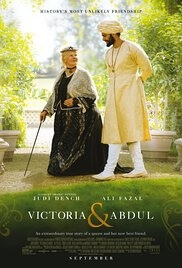Judi Dench is queen for yet another day in the tepid Victoria And Abdul

Is Victoria And Abdul a genteel arthouse version of the 20-years-later sequel? It’s not from the same creative team that delivered 1997’s Mrs. Brown, in which Judi Dench played Queen Victoria in a close relationship with a Scottish servant. But it does feature Dench playing Queen Victoria again—and again forging an unexpectedly close bond with an underling. There are behind-the-scenes royal parallels, too: Shakespeare In Love’s John Madden also made Mrs. Brown, the first of his four films with Dench, while Victoria And Abdul is the third Stephen Frears movie to star Dench. Frears also made two movies with Helen Mirren playing Queen Elizabeth II.
This makes Victoria And Abdul both part of a rich tradition and without a strong reason to exist, rather like a contemporary royal family. Its nominal reason for being is to shed light on how, in her later years, Victoria came to confide in an Indian man named Abdul (Ali Fazal), who was recruited in the late 19th century to travel to England and present “his” queen with a ceremonial coin. Abdul is chosen primarily due to his height, and is paired with the surlier Mohammed (Adeel Akhtar, funny here, just as he was in The Big Sick).
The set-up is treated as light farce, though the movie doesn’t bother to fully explain why Abdul feels honored, rather than inconvenienced, to leave his family to run a royal errand, nor does it really milk his cheerfulness for full comic potential. There is some amusing business as Abdul and Mohammed must contend with the ridiculous demand that they present Queen Victoria with a gift while not looking at her; then Abdul exceeds expectations of supplication, and Victoria starts asking him questions. They strike up an unlikely friendship, with Abdul’s family joining him in England.
Victoria is introduced as overweight and sleepwalking through her day, barely bothering to get out of bed and eating meals with her hands. With Abdul, she shows curiosity and vulnerability, especially regarding the deceased members of her family who she misses terribly. It’s no surprise that Dench excels at playing a queen who finds a new way to give zero fucks, morphing from dead-eyed despondence to fiery defiance of anyone who suggests Abdul has no place as a palace consultant.
Among those making such suggestions is Victoria’s grumbling son Bertie (Eddie Izzard), who leads the English supporting cast in a series of outraged tut-tuts and what-on-earths. Scenarios and even scenes repeat themselves as Victoria And Abdul fails to make much of a case for its characters’ friendship apart from the fact that it seems pretty nice. The movie unthinkingly assumes at least some degree of Abdul’s wonder at his good fortune, and only makes the mildest nods toward its troubling circumstances, as when British officials augment actual Indian outfits to make them more “authentic” to their colonialist eyes.
Maybe this wouldn’t be as much of a problem if the movie pursued comedy with more purpose, more irony, more something. Frears does run through the culture-class business with energy, faring best when playing up the movie’s comic side: cutting to a doctor fleeing an intimate sight, or suddenly panning to reveal an extra character in the frame. But, presumably because Dench is so famous for queenly roles, Victoria is allowed a certain seriousness and depth that throws the movie out of balance. Late in the film, she gets a big monologue to her protesting staff, shot in close-up to capture plenty of emotional range: her anger, her loyalty, her isolation. Poor Fazal stays on the smiles-and-dignity beat. The “big adventure” he’s on doesn’t belong to him. Neither does the movie. It’s just another piece of well-decorated regal real estate.